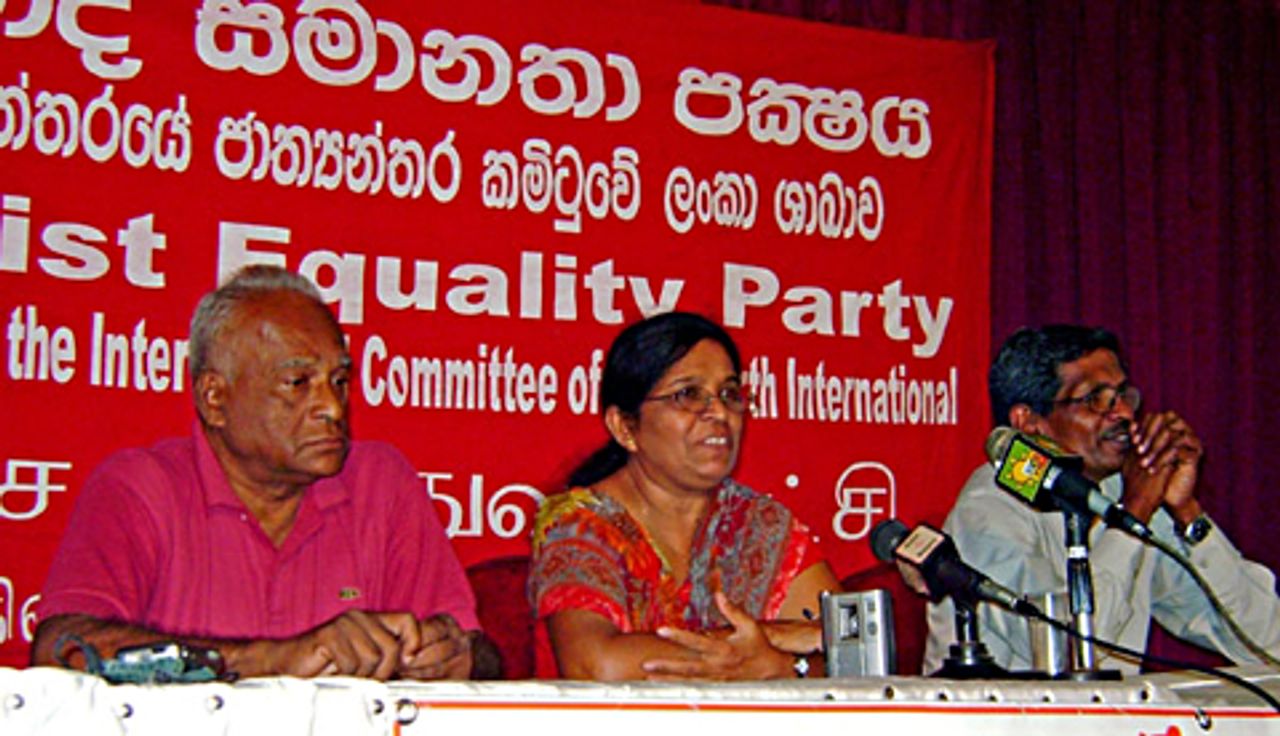The Socialist Equality Party (SEP) in Sri Lanka held a press conference in Colombo on Thursday to condemn the anti-democratic measures being carried out by the government of President Mahinda Rajapakse, including the arrest of opposition candidate General Sarath Fonseka.
SEP Political Committee member Vilani Peiris made a statement in Sinhala, which was translated into Tamil and English. Journalists from the private radio station Hiru FM, the Tamil daily Veerakesari, and the Island, an English language newspaper, were present. Copies of the statement “Sri Lankan SEP condemns opposition candidate’s arrest” were distributed.
 Vilani Peiris addressing press conference
Vilani Peiris addressing press conference
Peiris said that the Rajapakse government faced an acute political and economic crisis. Its crack-down on political opponents and media organisations, and the victimisation of union activists in workplaces, demonstrated its determination to silence any criticism.
“The arrest and detention of Rajapakse’s main rival Sarath Fonseka is a fundamental attack on the democratic rights of the people,” she said. “It shows that the Rajapakse government is rapidly moving towards establishing a police state. While the SEP has no political agreement with Fonseka, we unconditionally condemn this undemocratic act by the Rajapakse government and demand he be released immediately”.
Peiris explained that there were no fundamental differences between the Rajapakse government and the opposition parties that backed Fonseka. However, important tactical difference existed over how to impose the burden of the economic crisis on the working class and to suppress their emerging struggles. Therefore, the real target of the anti-democratic attacks is not Fonseka, but the working class in this country.
“Some 14 journalists and media workers have been killed so far over the past four years and several media organisations, including Sirasa TV, the Lanka paper of the Janatha Vimukthi Peramuna [JVP] and Lankaenews have faced government attacks and harassment. The Lanka editor was arrested and released after being held for weeks. A news journalist has disappeared. Now the government is planning to restrict the Internet as part of these attacks,” she said.
“The United People Freedom Alliance [UPFA] government of Rajapakse and the opposition camp represented by Fonseka share the same economic policy which represents the interests of the capitalist class and big business. Both Rajapakse and Fonseka conducted the war against the separatist Liberation Tigers of Tamil Eelam [LTTE] and are responsible for the war crimes of the security forces. Nearly 300,000 Tamils were detained after the end of the war last May and there are still 100,000 people in those detention camps.
“Since independence in 1948, the major parties have been based on racist anti-Tamil policies. They abolished citizenship rights for Tamil plantation workers in 1948, in 1956 they established Sinhala as the official language, and in the 1972 constitution they made Buddhism the state religion. In 1983 this communal policy, which was always aimed at dividing the working class, erupted in a brutal war to suppress the Tamil minority that lasted 26 years,” she said.
Peiris explained that the main opposition parties, the right-wing United National Party and the JVP, supported the war and the suppression of the democratic rights of Tamils. At the same time, the ex-left parties—the Nava Sama Samaja Party (NSSP) and United Socialist Party (USP)—lined up behind so-called peace talks backed by the major imperialist powers.
“The SEP was the only party to oppose the war on the basis of socialist internationalism. Our party demanded an end to the war and the unconditional withdrawal of Sri Lankan troops from the North and East. It was a part of our struggle in defense of the democratic rights of Tamils and working people and to unite Sinhala and Tamil-speaking workers. In doing so we demarcated ourselves from the LTTE, which did not stand for the interests of the ordinary Tamil people but for those of the Tamil bourgeoisie.”
Peiris noted that Rajapakse had promised peace and economic prosperity once the fighting ended, but the people are experiencing deepening communal tensions, deteriorating living standards and attacks on democratic rights. She added that the SEP’s warnings during the presidential election had been completely vindicated.
The speaker pointed to the island’s worsening economic crisis, saying: “Government debt has risen to 4 trillion rupees, which is 90 percent of GDP. When Rajapakse faced an acute foreign exchange crisis last year, he took out a $US2.6 billion loan from the International Monetary Fund. Now the IMF is demanding the government reduce the budget deficit from the present 11 percent of GDP to 5 percent by 2011. That means slashing social services and subsidies and imposing new taxes on the working class.”
Peiris explained that Sri Lanka was not exceptional, and that countries around the world were preparing to make huge inroads into the living standards of working people. At the same time, the global economic crisis was fuelling intense rivalry between the major powers, drawing in countries like Sri Lanka, and raising the risks of conflict and war.
She said that the SEP has decided to contest the Jaffna, Nuwara-Eliya, Colombo and Galle districts in the April general parliamentary election, to warn the working class about the dangers that it confronted and to begin to unify and mobilise workers to fight for their independent class interests. Peiris said that the party and its candidates would be fighting for a socialist program for a workers’ and farmers’ government in Sri Lanka as part of the broader struggle for socialism in South Asia and internationally. She said a fuller election announcement would be made at a future date.
Suriyan FM and the Tamil radio station Hiru FM reported the SEP’s press conference on Thursday evening and Veerakesari and the Island published articles the following day. Several other media outlets that were unable to attend later contacted the SEP to request copies of the party’s statements.
